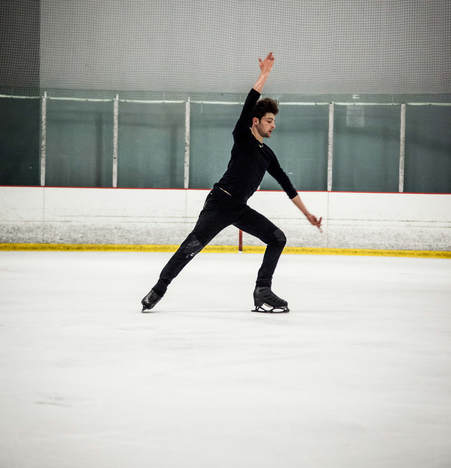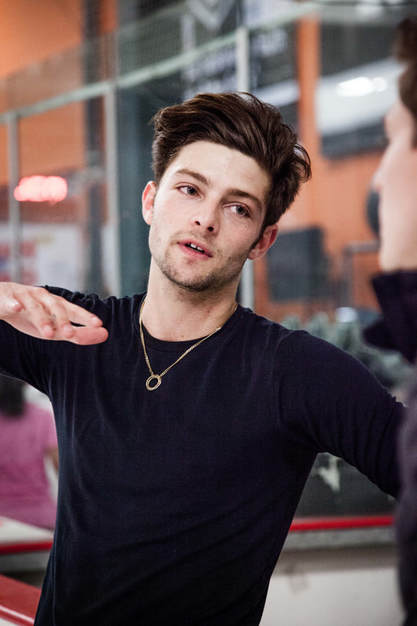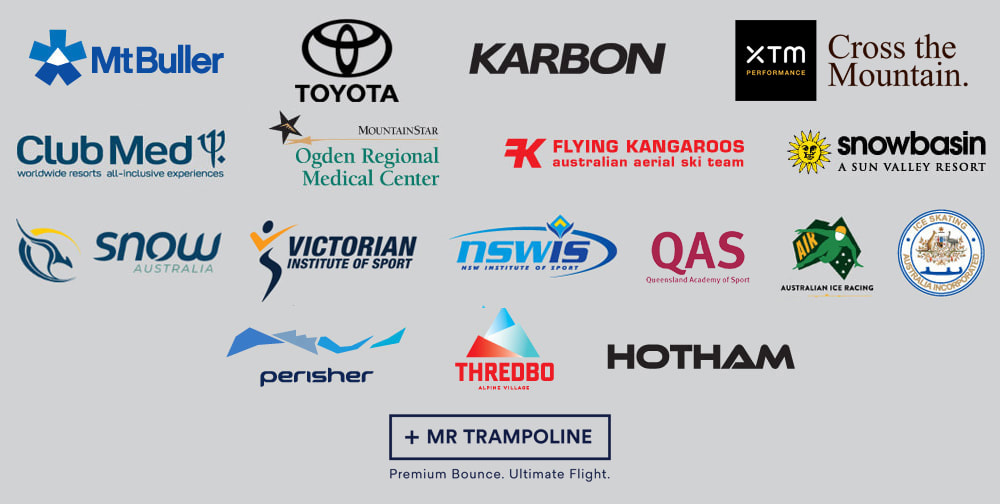 Figure skater Brendan Kerry training at Riverside, Los Angeles last week. Photo: Carly Gold
Figure skater Brendan Kerry training at Riverside, Los Angeles last week. Photo: Carly Gold The insecure 18-year-old who went to Sochi in 2014 after a surprise qualification (even to himself) has been replaced by a mature, elite athlete who has learned how to train, manage his time and his expectations.
After placing 15th in the 2017 World Championships, Kerry qualified Australia directly into the men’s event in PyeongChang and that was a relief to the Los Angeles based skater.
Despite managing a nagging foot injury that impacted upon his quad jumps, Kerry reached the top five in multiple international events, posted PBs at almost every event he entered – and became a force to be reckoned with.
“Reflecting on last season, I feel as though I can’t be anything but happy. The main goal was to qualify for the Olympics, which is what I did and what everything was based around. So, no complaints,” Kerry said.
But was he satisfied with his results?
“World Championships? No, I wasn’t - because honestly I feel as though last season I played a lot of head games with myself, but for first time in my life I was one hundred percent sure I was going to do perfectly.”
“It was such a strong field but I was not nervous or stressed about anything. In Finland (at the World Championships) I lost my feet the whole week and I was not having a good week on practise.”
“I had been so injured all season but pushed myself, so I knew I could get my job done. I was pretty excited when it was over. It feels way cooler to qualify this time around,” he recalled.
Athletes often review their best performances with one word – ‘relief’. Kerry fits in that boat.
“Qualifying was the biggest relief. To have a whole year to plan around the Olympics is a yes and no advantage. My focus is about being at the Olympics - not getting to be at the Olympics. There’s a difference.”
“Last year I was focused on trying to have a comfortable short program with brief moments of artistry. This year will be different. I definitely feel like a very different skater again.”
Last year’s music choices and choreography centred around cheeky-style characters with Singing in the Rain for the short and Pirates of the Caribbean for the free program.
Kerry’s Olympic season programs are in a totally different category.
The character pieces are gone, replaced with two intricate, artistically demanding pieces choreographed by two very different choreographers in Mark Pillay for the short program and Nikolai Morozov for the free program.
Pillay, from Vancouver, has worked with Kerry for many years and has delivered a short program to ‘Everyone wants to rule the world’, which coach Tammy Gambill thinks is amazing.
“I love the short,” Gambill said the first time she watched it in May. “It’s amazing and it’s impressive what Brendan is doing now. I can see a difference already.”
Kerry was seeking a challenge and he has it.
“Mark and I were trying to make the short as difficult for me as possible in all aspects. Not a single week has gone by that I haven’t had a compliment on the music and the program.”
Pillay’s music choice is no accident.
“Essentially, the theme somewhat parallels Brendan position in the world of figure skating. He’s climbing the ladder amongst several other competitors that are clawing their way to the top. I felt the concept really worked for Brendan and it was an idea we both could get behind, plus the orchestration is incredible, so it felt very fitting to use in an Olympic season,” Pillay explained.
Having watched the boy become a man, Pillay reflected on the years they have worked together.
“I remember my first experience with Brendan. Often times when you get new clients, they really want to impress you. And that was the same for Brendan. He was trying almost too hard, that he was getting in his own way.”
“Now – things are different and the process is much more natural and fluid. Last season Tammy, Brendan and I all discussed how we wanted Brendan to invest more in his choreography.”
“We all knew his technical ability was highly proficient, but now it was time to tackle the other side of his skating.”
“In my field, I’ve always known that progress and the developmental has to come from the skater. You can say all the right things, but if they’re not ready, then that’s the reality. I think last year Brendan was ready to step up and get his Olympic spot. I saw him make that choice all year long, and he went out there and did his job in Helsinki.”
“This year, Brendan came to me and said, ‘I want to change the way I skate’, and I really respect Brendan for that.”
“Last year we saw how well he could handle character pieces, but even though he knew he was good at it and that it would be a safe choice, he didn’t want to go in that direction. He wanted to develop more depth in his skating – and that is what we’re trying to do in his new short program.”
As charming as Kerry is, it’s the serious side that is being explored.
“Anyone who knows Brendan knows that he’s charming. He just is. And with that charm often comes laughter. So more often than not, we laugh a lot together. He’s immensely talented, but talent can be a challenging attribute to have. You have to respect talent, train it, and at times be humbled by it,” Pillay said.
Having finished the short program in May, Kerry was scheduled to embark on his next challenge - the new free program with the mercurial and very successful New Jersey based Russian coach/choreographer, Nikolai Morozov.
 Brendan Kerry. Photo: Carly Gold
Brendan Kerry. Photo: Carly Gold The heel of the blade of the left foot went through the boot and into the inside of his right foot.
“Rehab has been longer than I wanted,” he said of the ten weeks it took to get back on track.
“It was a disgusting amount of rest. There was bone bruising and I had murdered some of the nerves in my foot. They reconnected in a different way but there’s no structural damage, even though my head is saying there’s still pain.”
He returned to Australia in July for strength and condition training at the NSW alpine base in Jindabyne with OWIA’s Head of Preparation John Marsden.
“The off-ice training I was doing wasn’t tailored enough. Working face to face with John and having time with him was important so that he could see exactly where I’m at and what I want,” he said.
“We worked hard to gain the physical strength, correct techniques and we also sat down and sorted out my comp schedule with off-ice periodisation.”
It was the first time Kerry had worked alongside Australian winter athletes from snow sports.
“Working in that setting and being with other Australian winter athletes was nice. The girls thought they could outdo me in an abs contest. That wasn’t going to happen!”
He returned to on ice training in August by spending three weeks in New Jersey with Morozov for the free program to ‘Valley of Dreams’.
“I was able to do everything as of first week of August albeit still painful but bearable. I like the free program a lot. It’s native American and we were fine tuning every step and beat.”
“It’s hard working with Nikolai. Parts of my body were hurting that shouldn’t be by using different body positions. Doing movement is not enough. I can’t tell you how many times I’ve fallen over just doing his choreography.”
“Usually when I skate I have a very bad habit of remaining on axis no matter I do, but the way Nikolai is teaching me the program, there’s more extreme lean, using core strength and balance to maintain the position.”
“It’s very different how Nikolai goes about choreography. I feel like you tell people to do a rocker turn, but to Nikolai it’s not just how you do a rocker but that you could do it in a million different positions. He pushes the boundaries. Doing a rocker like everyone else isn’t good enough.”
Kerry debuted his two new and very different programs in a local Los Angeles competition last weekend. There’s a way to go as the programs develop, however they exhibit a hitherto unknown complexity.
The quads are there, the skating skills enhanced, the spins continue to improve, yet the biggest change is the seamless integration of transitions to jumps and spins in an almost mesmerised fashion.
Kerry’s personal challenge will be real. Both programs are magnificently conceived which will require a matching effort.
“In hindsight, what I have learned is that every single bit of preparation is beyond important. We’ve been training hard through the injuries and difficulties. Olympics is a very, very different mentality than any event - ever. I had to make my previous maximum my minimum.
Kerry opens his international season at the Lombardia Trophy in Bergamo, Italy from September 14 to 17 (Results and information here) then onto the Ondrej Nepala Trophy in Bratislava September 21 to 23 (results and information here).
“I would like to do no worse at these comps than I did at Worlds performance wise,” he said.
A further test of the new programs will come at the Skate Canada Grand Prix at the end of October but the main game is Olympics.
“Toward PyeonChang, I feel really calm. I’m at a point in my career that I know how the season works. From a mental standpoint, I know how to train. My coach and choreographers keep my head in check.”
By Belinda Noonan
OWIA



 RSS Feed
RSS Feed






